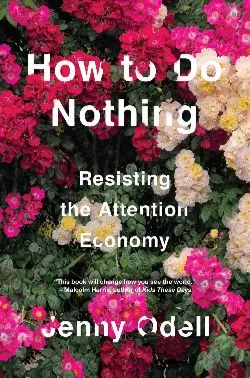
How to Do Nothing is not your classic self help book. In fact, it has much closer kinship with the works of figures like James Bridle than it does Eckhart Tolle or Thich Nhat Hanh. Jenny Odell instead offers an evaluation of the “attention economy” centered around a few major themes, including the refusal to be “on” all the time, working to maintain our attention on the little things in life, and developing community with others.
Significantly, at no point does Odell argue that we should literally do “nothing.” This is not Paul Lafargue’s The Right to Be Lazy. Instead, Odell calls us to take control of our own lives by actively choosing what should take up our attention. In Odell’s view, there is little space for doom-scrolling, but there is space for recharging away from the constant bustle of life.
Some of the most interesting discussion appeared early in the book: the second chapter has a discussion of Epicurus, who instituted an academy outside of Athens, and the communes of the 1960s. Epicurus urged his followers to retreat from society in defense of the good life. This call did not come out of some desire to bury their heads in the ground, but to maintain the ability to choose what matters.
As I read, I thought about my own life. In the past, I’ve talked a bit about my withdrawal from social media. Part of this comes out of a refusal to accept the fast, knee-jerk reactions that are rewarded by traditional forms of social media. It also leads to what Odell calls “context collapse”: where content (whether it be a Tweet, clip, or sound-byte) is pulled out of its orginal ecosystem and spread throughout the internet without its original context.
While I have not been a victim of this, it is something that I might worry about, especially should I become more vocal online. By building my own website, I can ensure that everything is in its own place. Others can do as they please, but anyone who is willing to put in the time will be able to see my words as they were originally written.
Ultimately, Odell’s book is a reminder ot slow down, “touch grass,” and pay close attention to the real things in life. We may use the internet and other technologies as a portal to “another world,” but we must always remember to ground ourselves in the world of the physical senses. After all, when we engage online, we are acting in overwhelmingly cognitive ways, without allowing the rest of our abilities to take part.